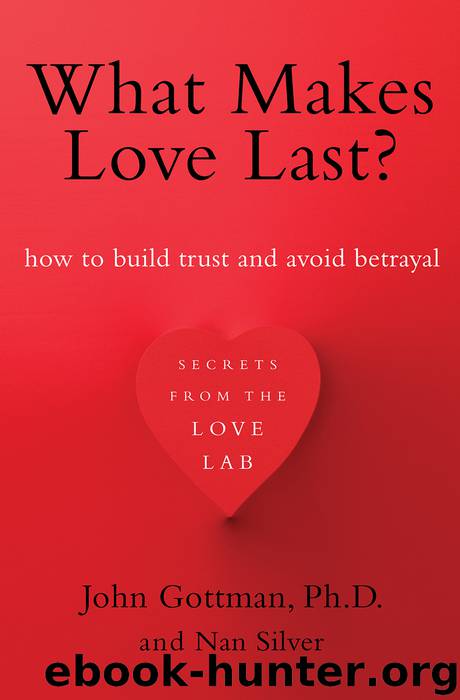What Makes Love Last? by John Gottman

Author:John Gottman
Language: eng
Format: epub
Publisher: Simon & Schuster
The Next Step: Persuasion and Problem Solving
When you both feel heard and understood, you begin to negotiate your differences. Throughout this process, remain open to your partner’s influence, but do not overcompromise. When problem solving doesn’t work, it is often because at least one partner agrees to give up too much and then reneges. To avoid this mess, start by identifying your core needs to ensure that you—and your partner—are clear on what concessions you cannot make. I recommend that couples write down these needs and draw a circle around them. (“I cannot live far from my family,” “I have to exercise every day.”) Try to keep this list very short by including only needs you know are essential to your happiness and, therefore, the relationship’s success. Use “I” sentences to describe these non-negotiables so your partner does not feel criticized or coerced. “I need us to spend more time socializing with others” expresses a core need. “I need you to be more outgoing” is criticism.
Next, draw a much larger circle around the first one. Inside, list any aspect of your position that you can modify. Although you cannot compromise on the need itself, perhaps you can bend on some specifics, such as the timing, location, or methods used to achieve your goal. (“I can live with going out every other weekend,” “I can switch to a closer gym so I get home sooner.”) The solutions you arrive at won’t be as obvious as these examples—if they were, you wouldn’t need this process to resolve the conflict! Expect a great deal of struggle and back and forth as you search for ways to weave each other’s areas of compromise into an approach that you can both accept. Be open to your partner’s creative suggestions. The process can take a long time, but I have seen couples succeed even when their core needs seemed incompatible. After years of living in the suburbs, Pam wanted to spend her retirement years in the city. But her husband, Mike, had long dreamed about them sailing around the world together. By focusing on their areas of compromise, they came up with a solution that both could endorse: they would spend two years sailing and then two years living in New York. After that, they would see where they stood.
There are circumstances that can prevent successful compromise. If it turns out that one person’s dream is truly the other’s nightmare, there is not a way forward. In a typical case, only one partner wants to have children. Couples usually cannot bridge this difference and sometimes probably should not. But by using the blueprint to sort this out, you can end the relationship with a clear understanding of why you each needed to move on.
In most relationships, though, this process does lead to a compromise. It may take more than one meeting to reach an accord. You’ll need time to consider your partner’s position and all the options you’ve discussed. Here’s how Mercedes and Oscar use the blueprint to work out their disagreement over their daughter, Lydia.
Download
This site does not store any files on its server. We only index and link to content provided by other sites. Please contact the content providers to delete copyright contents if any and email us, we'll remove relevant links or contents immediately.
Should I Stay or Should I Go? by Ramani Durvasula(7642)
The Lost Art of Listening by Michael P. Nichols(7485)
The Rosie Project by Graeme Simsion(6364)
Beartown by Fredrik Backman(5726)
We Need to Talk by Celeste Headlee(5604)
Ego Is the Enemy by Ryan Holiday(5406)
Hunger by Roxane Gay(4920)
Suicide Notes by Michael Thomas Ford(4812)
I Love You But I Don't Trust You by Mira Kirshenbaum(3858)
Mummy Knew by Lisa James(3676)
Not a Diet Book by James Smith(3405)
Crazy Is My Superpower by A.J. Mendez Brooks(3386)
Toxic Parents by Susan Forward(3276)
Girl, Wash Your Face by Rachel Hollis(3273)
The Complete Idiot's Guide to Coping With Difficult People by Arlene Uhl(3138)
The Social Psychology of Inequality by Unknown(3013)
Name Book, The: Over 10,000 Names--Their Meanings, Origins, and Spiritual Significance by Astoria Dorothy(2967)
The Hard Questions by Susan Piver(2967)
The Gaslight Effect by Dr. Robin Stern(2789)
